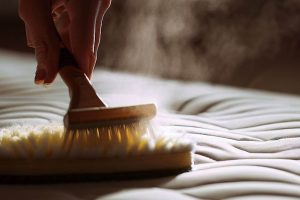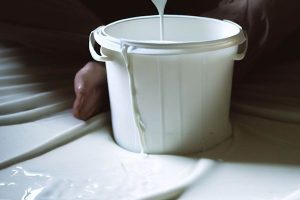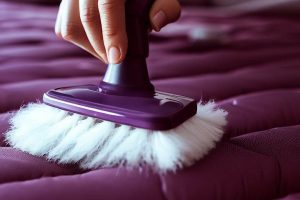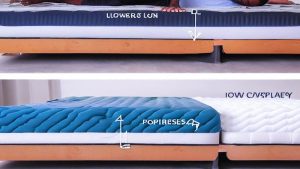Have you ever been in a situation where your mattress is soaking wet and you need to know How Long Does It Take For A Mattress To Dry?
On average, it can take up to 8 hours for a mattress to completely dehydrated. However, certain factors such as the material of the mattress and the drying method used can affect this time.
In this Nousdecor article, I’ll explain why keeping a mattress dehydrated is important, the best methods for drying your mattress quickly, and what to consider for different materials.
Key Takeaways
- Wet mattresses can lead to mold growth and cause health issues such as allergies and respiratory problems.
- Using a wet/dry vacuum cleaner and proper air circulation can help expedite the drying process.
- Sprinkling baking soda on the mattress can absorb moisture and prevent odors.
- Drying duration depends on the material and saturation level of the mattress, so patience is key in allowing it to airdry over a duration.

Why Is My Mattress Wet?
It may take a while for your mattress to dehydrate if it’s wet, so patience is key! A mattress often gets wet when the upholstery or fabric becomes saturated with moisture and water. If left untreated, this can lead to mold growth on the surface of the mattress.
To prevent this, you need to clean the area immediately and follow these steps:
- Remove any excess water from the mattress with a damp cloth.
- Air out any residual moisture by using fans.
- Set up an airflow system that will allow for proper drying.
To ensure your mattress is completely dehydrated, check in on it once in awhile to make sure there isn’t any extra moisture or water present.
Taking these steps will help keep your mattress dehydrated and free from mildew and mold.
Why Keep a Mattress Dry?
Waiting for your mattress to dehydrated completely is critical, so try to be patient. This will help prevent mold from developing while also ensuring it remains comfortable and hygienic.
To dehydrate a wet mattress quickly, you can use a wet/dry vacuum or place it outside under the sunlight if the weather permits. Additionally, you can use an air mover or fan to expedite the drying process. Memory foam mattresses should not be dried this way since heat exposure can damage the material.
You may also want to invest in a waterproof mattress protector as an additional safeguard against moisture buildup and potential damage.
Keeping your mattress dehydrated is key to its longevity and comfortability; be sure to take all necessary steps to ensure that happens!
Mattress Drying Techniques and Methods
As an experienced mattress owner, I know that keeping your mattress dehydrated is essential to its longevity. Liquid absorbing materials such as towels or even a wet/dry vacuum can be used to quickly remove water from the mattress.
Sunlight also helps in drying the mattress more effectively, so if possible, try to keep it outside for direct exposure. Remember though; patience is key when allowing your mattress to dehydrate thoroughly before using it again.
Liquid Absorbing
You need to be patient when your mattress absorbs liquid, as it could take anywhere from 6-48 hours for it to dehydrate completely. It all depends on the material of the mattress and how saturated it is.
To help speed up the process, you can use a wet/dry vacuum cleaner or cover the mattress with baking soda. This will absorb some of the moisture and make drying quicker.
If you want to clean your mattress while it’s drying, use a detergent specifically designed for mattresses to avoid damaging fabrics or fibers.
In any case, thoroughly dry a wet mattress before using it again – no matter how long it takes!
Use a Wet/ Dry Vacuum
Using a wet/dry vacuum cleaner is an efficient way to help your mattress dry faster.
Start by vacuuming the area around the mattress, then the mattress itself. This will help to remove any excess moisture that may be lingering on the surface.
Next, sprinkle some baking soda onto the mattress and gently rub it in. This will help to prevent any odors from forming while also aiding in the dehydrating process.
After this, turn on your vacuum cleaner and allow it to run for several minutes so that it can extract as much moisture as possible from inside your mattress.
Finally, make sure there is adequate air circulation in the room where you are dehydrating your mattress – this will ensure that it dries quickly and evenly.
With these steps taken, you should be able to dry your mattress within a reasonable amount of time without having to wait too long!

Dry in Direct Sunlight
Sunlight is an effective way to dry your mattress quickly. Utilizing the power of direct sunlight and a little bit of baking soda, you can get your mattress completely dry swiftly. Here are three tips for dehydrating out a wet mattress:
- Place a waterproof mattress protector over it before laying it out in the sun.
- Sprinkle some baking soda over the areas that have been soaked with water or rubbing alcohol.
- Turn it at least twice during the day so that both sides of the mattress are exposed to sunlight evenly.
Following these steps will not only help you dry out your mattress faster but also provide helpful information on other topics such as how to store a mattress in a garage, choosing the best mattress topper storage tips, mattress sweat stain removal guide, tips for a comfier sleeper sofa, and even dismantling your Sleep Number mattress for back pain relief on air mattresses!
How Long Does It Take For A Mattress To Dry?
It can take anywhere between 24-48 hours for a mattress to completely dry after it’s been soaked with water, depending on the material and how saturated it is.
Baking soda, for instance, is an effective way of dehydrating your mattress if you’re in a hurry. However, be aware that this method can also cause damage to some materials like foam mattresses or certain fabrics.
Staying safe on bubbled air mattresses requires patience; allowing them to air dry over a duration is usually the best bet.
Ultimately, how long it take for your mattress to dry will depend on the material and saturation level but can range from 6-48 hours.
Knowing the factors that affect mattress dehydrating duration will help you make sure your bed is ready when you need it!
Factors that Affect Mattress Drying Time
As a mattress owner, I’m sure you’d like to know what factors influence the dehydrating duration of your mattress.
The amount of moisture in the mattress is an important factor; if it’s soaked, it will take much longer to dry than if it’s slightly damp.
Temperature and humidity levels also play a role; higher temperatures and lower humidity allow for quicker evaporation.
The Amount Moisture In The Mattress
You’ll need to take into account the amount of moisture in your mattress when determining how long it will take for it to dry. For instance, if you’ve recently spilled a beverage or gotten caught in the rain, then your mattress is going to be more saturated than usual. This means that it’s going to take longer for it to completely dry.
On average, these mattresses can range anywhere from:
- 6-8 hours using natural air drying methods
- 1-2 days using fans indoors
- Even longer if the mattress is especially wet and made from certain materials
The key is patience! Allowing your mattress enough time to properly dry out before use is essential for its longevity and comfort—so make sure you don’t rush this operation!
The Temperature and Humidity Level
The temperature and humidity level can significantly affect how quickly your mattress dries. It’s important to take note of these conditions.
High temperatures and low humidity levels will speed up the drying operation. Cooler temperatures paired with high humidity could mean that it takes much longer for your mattress to dry out.
If you’re using a fan to help the drying operation indoors, make sure that it is not too close to the mattress. This could cause the material to become overly dry and brittle.
On the other hand, if you are relying on natural air circulation, be aware of wind direction. Having windows open in opposite directions can create a draft which will help air circulate quicker throughout your bedroom.

The Amount of Air Circulation
To speed up the drying operation, ensure plenty of air circulation around your mattress. This can be done by either placing a fan directly facing the mattress or propping up the mattress with blocks so that it gets maximum air circulation. Additionally, you can leave any windows open in the room to provide additional ventilation.
Here are three tips I’d suggest for proper air circulation:
- Place a fan near your mattress to help dry it faster.
- If possible, prop up your mattress with blocks.
- Leave any open windows in the room for extra ventilation.
Considerations for Different Mattress Materials
As a mattress owner, it’s important to understand the considerations for different mattress materials when drying your wet mattress.
Innerspring, foam, hybrid, and latex mattresses all have unique properties that will affect how long they take to dry after being soaked in water. How quickly these materials will dry depends on their composition, thickness, depth of saturation, and other factors.
Therefore, it’s essential to be aware of the nuances of each type of material before attempting to dry a wet mattress.
Innerspring
It’ll take 1-2 days for an innerspring mattress to dry completely after it’s been soaked with water. If you’re trying to dry out your mattress at home, make sure you give it enough time since the operation can take a while.
Here are three tips for getting your innerspring mattress dry:
- Use fans if drying indoors, but avoid placing them too close to the mattress or pointing them directly at it.
- Place the damp mattress outside in direct sunlight if possible – this will help speed up the operation.
- Make sure you wait until it is completely dry before using or returning it to its spot on the bed – otherwise, mold and mildew could form!
Foam
For foam mattresses, drying duration can vary but typically it’ll take 1-2 days for them to fully dry after they’ve been soaked with water.
It’s important to wait until your mattress is completely dry before using it again; otherwise, mold and mildew might start growing inside.
The duration it takes a foam mattress to dry depends on the material it’s made from and how saturated it is.
If you’re trying to speed up the operation, make sure that you keep the windows open and use fans to circulate air in order to create a cooling environment for your mattress.
And don’t forget: patience is key!
Hybrid
Hybrid mattresses usually need 24-48 hrs to dry completely after being soaked with water. It may take longer if dried indoors with fans, depending on the mattress material and how saturated it is. But patience is key as there are a few factors that can affect the drying duration:
- The type of fabric used in the mattress
- How damp or wet the mattress was when you started drying it
- The thickness of it
When dealing with a hybrid mattress, don’t rush the process as this could cause irreversible damage to your bedding investment. Instead, let nature do its job and wait for your mattress to dry naturally over a duration. Don’t forget to clean and deodorize while you’re at it!

Latex
Latex mattresses can take longer than other types to dry completely after being soaked with water. The duration it takes for a latex mattress to dry depends on the material it is made from and how saturated it is.
Generally, you should expect your mattress to take anywhere between 1-2 days to air dry. However, if you are trying to speed up the process by using fans indoors, this can add a few extra hours onto drying duration.
It’s important not to rush this process as waiting for your mattress to fully dry will help ensure its longevity and prevent future mold or mildew growth. If you find that the drying process is taking too long, consider calling in professional assistance for help.
Call for Professional Assistance to Dry Your Mattress
If your mattress is soaked with water, it’s best to call for professional assistance to dry it. It would be impossible and unwise to try drying the mattress indoors by yourself – fans won’t cut it! Professional help ensures that your mattress will be completely dry quickly as you’re choosing your perfect bed mattress.
They have access to specialised equipment like high-speed fans and industrial dehumidifiers. They know the right techniques and methods for drying a mattress. And they can provide you with advice on how to prevent future damages from occurring.
Getting professional help is the only way of ensuring that your mattress dries quickly without causing any further damage. If you decide not to take this route, you may find yourself waiting for days before your bed becomes usable again!
Frequently Asked Questions
Conclusion
In conclusion, drying a mattress is an important part of maintaining its longevity. It can take 6 to 8 hours for the mattress to dry completely, but this timeframe can be extended depending on the material and saturation level.
Waiting patiently and using the right techniques can ensure your mattress dries without a hitch – just like a duck takes to water! With proper care, you’ll have your mattress ready swiftly at all.






